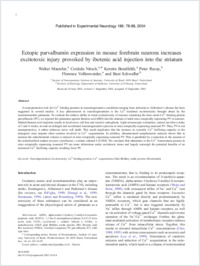Ectopic parvalbumin expression in mouse forebrain neurons increases excitotoxic injury provoked by ibotenic acid injection into the striatum
- Maetzler, Walter Section of Neuroanatomy, Institute of Anatomy, University of Basel, Switzerland
- Bendfeldt, Kerstin Section of Neuroanatomy, Institute of Anatomy, University of Basel, Switzerland
- Racay, Peter Division of Histology, Department of Medicine, University of Fribourg, Switzerland
- Vollenweider, Florence Section of Neuroanatomy, Institute of Anatomy, University of Basel, Switzerland
- Schwaller, Beat Division of Histology, Department of Medicine, University of Fribourg, Switzerland
-
25.01.2004
Published in:
- Experimental Neurology. - 2004, vol. 186, no. 1, p. 78-88
neurodegeneration
excitotoxicity
Ca²⁺-binding proteins
Ca²⁺ sequestration
glial fibrillary acidic protein
mitochondria
English
A neuroprotective role for Ca²⁺-binding proteins in neurodegenerative conditions ranging from ischemia to Alzheimer's disease has been suggested in several studies. A key phenomenon in neurodegeneration is the Ca²⁺-mediated excitotoxicity brought about by the neurotransmitter glutamate. To evaluate the relative ability to resist excitotoxicity of neurons containing the slow-onset Ca²⁺-binding protein parvalbumin (PV), we injected the glutamate agonist ibotenic acid (IBO) into the striatum of adult mice ectopically expressing PV in neurons. Striatal ibotenic acid injection results in local nerve cell loss and reactive astrogliosis. Light microscopic evaluation, carried out after a delay of 2 and 4 weeks, reveals an enlarged and accelerated neurodegenerative process in mice ectopically expressing neuronal PV. Thus, PV is not neuroprotective, it rather enhances nerve cell death. This result implicates that the increase in cytosolic Ca²⁺-buffering capacity in the transgenic mice impairs other systems involved in Ca²⁺ sequestration. In addition, ultrastructural morphometric analysis shows that in neurons the mitochondrial volume is reduced in mice ectopically expressing neuronal PV. This is paralleled by a reduction in the amount of the mitochondrial marker enzyme cytochrome c oxidase subunit I (COXI). We conclude that alterations in the Ca²⁺ homeostasis present in mice ectopically expressing neuronal PV are more deleterious under excitotoxic stress and largely outweigh the potential benefits of an increased Ca²⁺-buffering capacity resulting from PV.
- Faculty
- Faculté des sciences et de médecine
- Department
- Département de Médecine
- Language
-
- English
- Classification
- Biological sciences
- License
-
License undefined
- Identifiers
-
- RERO DOC 4888
- DOI 10.1016/j.expneurol.2003.10.014
- Persistent URL
- https://folia.unifr.ch/unifr/documents/299554
Statistics
Document views: 177
File downloads:
- Texte intégral: 436
